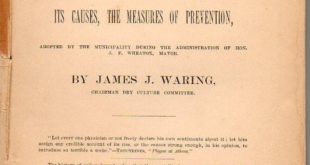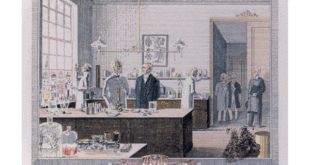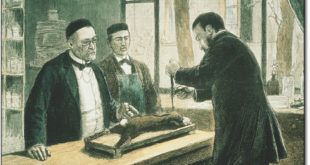par M. L. Pasteur, 1868 Mais quel est donc l’établissement où les laboratoires sont à ce degré malsains, humides, obscurs, mal aérés? C’est le premier établissement d’instruction supérieure de la France, celui qui porte le nom de la patrie, comme s’il voulait résumer en lui seul toute la gloire scientifique et littéraire : c’est le Collège de France ! La …
Read More »Articles
Mémoire sur la relation qui peur exister entre la forme cristallines et la composition chimique, et sur la cause de la polarisation rotatoire
par Louis Pasteur (1848) (Commissaires, MM. Biot, Regnault, Babinet, Balard.) Si l’on compare les formes cristallines de tous les tartrates quels qu’ils soient, y compris les émétiques, on s’apercevra sans peine que dans tontes ces formes plusieurs facettes se retrouvent inclinées entre elles de la même manière. En plaçant toutes ces formes les unes auprès des autres, on aura une …
Read More »On the Antiseptic Principle of the Practice of Surgery
Taken from the publication, “On the Antiseptic Principle of the Practice of Surgery.” The Harvard Classics.1909–14.” IN THE COURSE of an extended investigation into the nature of inflammation, and the healthy and morbid conditions of the blood in relation to it, I arrived several years ago at the conclusion that the essential cause of suppuration in wounds is decomposition brought …
Read More »Louis Pasteur and the Pasteur Pipet
The Pasteur Pipet was a basic instrument that played a crucial role in the experiments of Louis Pasteur experiments. Once the concept of Germ Theory was clearly established, the necessity to keep everything sanitized and free of germs was central to all experiments. Therefore, the Pasteur Pipet was developed to ensure liquids could be removed or transferred without introducing foreign …
Read More »The epidemic of Savannah
Originally published in “The epidemic of Savannah, 1876: its causes the measures of prevention, adopted by the municipality during the administration of Hon. J. F. Wheaton, Mayor” in 1879 BACTERIUM LINEOLA VIBRIO LINEOLA OF EHRENBERG. Under this designation I understand those rod bacteria, which are similar in all regards to the B. termo, but are much larger, and not only …
Read More »Louis Pasteur on Brewing Beer
Originally published in the “English mechanic and world of science, Volume XXIII” in 1876. M. PASTEUR has just published with the title, Etudes sur la Biere, a book which is indeed a book of combat. For more than fifteen years this eminent chemist has given his attention to fermentations; he has considerably forwarded their study. Extending his views, he has …
Read More »A Service to Brewers
Originally published in the “The Review of reviews, Volume XII” in 1895 The studies on wine prepare us for the “studies on beer,” which followed the investigation of silk worm diseases. The sourness, putridity, and other maladies of beer, Pasteur traced to special’ ferments of disease,’ of a totally different form, and therefore easily distinguishable from the true torula or …
Read More »A Text-Book of the Science of Brewing
Excerpt from Chapter VII, Fermentation published in 1891 In the preceding chapters we have described the preparation of worts, their hopping, boiling, cooling, and aeration. In this chapter we have to deal with the conversion of the wort into beer by fermentation. To effect this change we employ yeast, the main function of which is to convert the maltose and …
Read More »Pasteur and His Wonderful Experiments
Originally published in “The Dial, Volume VI” in 1886 At the recent International Medical Congress, held in the city of Copenhagen, among all the men who have distinguished themselves in the cultivation of the sciences pertaining to medicine, the one most signally honored was the subject of this biographical sketch. When he appeared in the public assemblies of the delegates …
Read More »Pasteur and Asiatic Cholera in Egypt
Originally published in the “Journal of the American Medical Association, Volume I.” FOREIGN CORRESPONDENCE. PARIS LETTER. Paris, August 8th, 1883. Of all the theories propounded at the Paris Academy of Medicine, I know of none more absurd than that enunciated by M. Decroix, a retired army veterinary surgeon, on the depopulation of France, and the degradation of the French nation. …
Read More » Pasteur Brewing Louis Pasteur – Science, Health, and Brewing
Pasteur Brewing Louis Pasteur – Science, Health, and Brewing 




